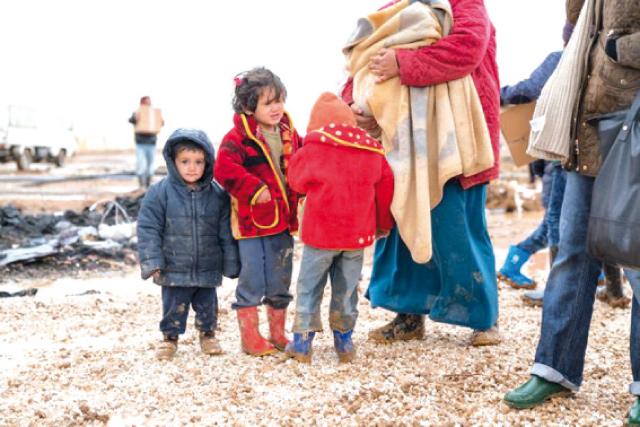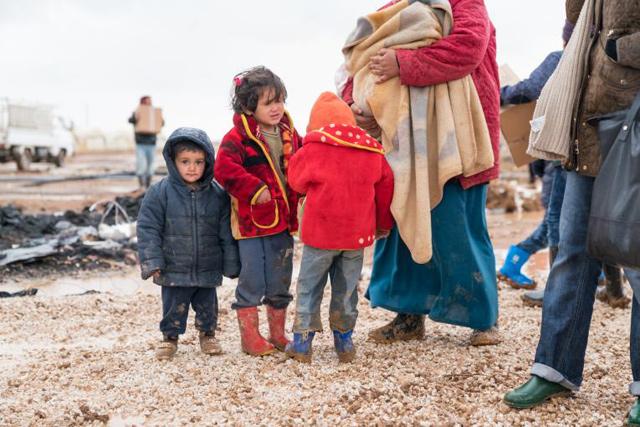You are here
UNICEF winter programme weaves warmth for children, jobs for youth
By Sarah Abu Zaid - Mar 09,2021 - Last updated at Mar 09,2021

UNICEF has procured 45,000 locally manufactured warm winter clothing kits for vulnerable children, according to UNICEF Jordan Representative Tanya Chapuisat (Photo courtesy of UNICEF Jordan)
AMMAN — UNICEF has procured 45,000 locally manufactured warm winter clothing kits for vulnerable children, UNICEF Jordan Representative Tanya Chapuisat told The Jordan Times.
According to Chapuisat, the production line has provided much needed employment opportunities to women and youth in Jordan, supporting the country’s economic recovery efforts and providing income generating opportunities for those hardest hit by the secondary impacts of the pandemic.
UNICEF is supporting close to 80,000 vulnerable children during the harsh winter months through cash assistance and warm clothing kit distributions. This includes the distribution of 45,000 children’s warm clothing kits and an emergency winter cash payment supporting 34,000 children through UNICEF’s Hajati programme, Chapuisat added.
Hajati is an unconditional but labelled cash transfer targeted at the most vulnerable communities, aiming to encourage parents to increase school enrolment and retention for their children, according to UNICEF.
“This emergency payment is a top up on the regular cash assistance provided by UNICEF to help children continue their learning and is designed to help families cope with the additional financial burden of increased heating and clothing costs during the coldest months,” Chapuisat said.
She also highlighted that UNICEF provides an integrated package of support for the most vulnerable children and youth in Jordan, which includes the Hajati cash assistance and the network of nationwide Makani centres, while also supporting the government to develop and implement social protection and poverty reduction strategies.
UNICEF Makani centres provide vulnerable children — both refugees and Jordanians — access to learning support services and community-based child protection
According to Chapuisat, this has included support to ensure that Jordan’s National Social Protection Strategy is child friendly and equity focused.
“We also provide technical support to the National Aid Fund in order to reach the most vulnerable children and families more effectively,” she said.
Chapuisat noted that, for the winter clothing kit production, UNICEF’s decision to procure the items locally has provided employment opportunities for over 250 women and youth in five locations in Jordan, which includes: Mafraq, Jabal Al Naser, Al Aqsa neighbourhood and Bayader Wadi Seer in Amman, and Balqa.
Chapuisat also highlighted that UNICEF is supporting youth skills building, employment and entrepreneurship
UNICEF’s Amaluna programme helps youth in economically disadvantaged areas by equipping them with the skills they need to increase their employability so that they can access meaningful and sustainable employment, and self-employment through entrepreneurship, Chapuisat added.
UNICEF also supports programmes that build digital knowledge and employability for the most vulnerable youth, especially with a focus on girls.
“Young women in Jordan are now accessing innovative training, including marketable digital skills, social entrepreneurship, and access to mentorship,” she said.
According to Chapuisat, a digital sourcing platform will connect young women with micro-work access, outsourced by private companies and organisations, engaging them in the digital economy, while also allowing them to work flexibly.
“Young women face the double burden of their gender and age status in Jordan, which prevents them from accessing opportunities beyond formal education,” she said.
Malak, a 24-year-old Jordanian, who was unemployed for a long time, saw an ad on social media for this opportunity to make children’s winter kits for UNICEF.
“The fact that we are making these kits for vulnerable children makes me pour my heart and soul into every piece,” she said.
For Salsabeel, an 18-year-old Jordanian, it is her first job.
“It is not very easy for those of us in rural areas to find jobs and this work is especially beneficial for people in the area with low incomes. It is going to help so many young students to pay for their studies,” she added.
Lara, a 22-year-old Jordanian, who in high school majored in textile production, and scored the highest mark in her major, found it difficult to secure a job.
In October, she applied for a tailoring opportunity, manufacturing winter kits for UNICEF and it was successful.
“I initially faced some resistance from my father given that we live far from the workshop and I had to take transportation every day, but once I secured transportation with the other girls, he encouraged me to stay,” she said.
“I feel very proud that I can now provide for myself, I am independent and I’m building my career,” Lara said.
Related Articles
AMMAN — With cold weather conditions due imminently, UNICEF has launched a $6 million Winter Children’s Appeal to help prevent a devastating
AMMAN — Socio-economic impacts of prolonged movement restrictions and the closure of all community and learning facilities have been particu
AMMAN — The government of Italy on Wednesday announced a 1.5-million-euro grant to UNICEF to support implementing “Hajati”, an integrated so













